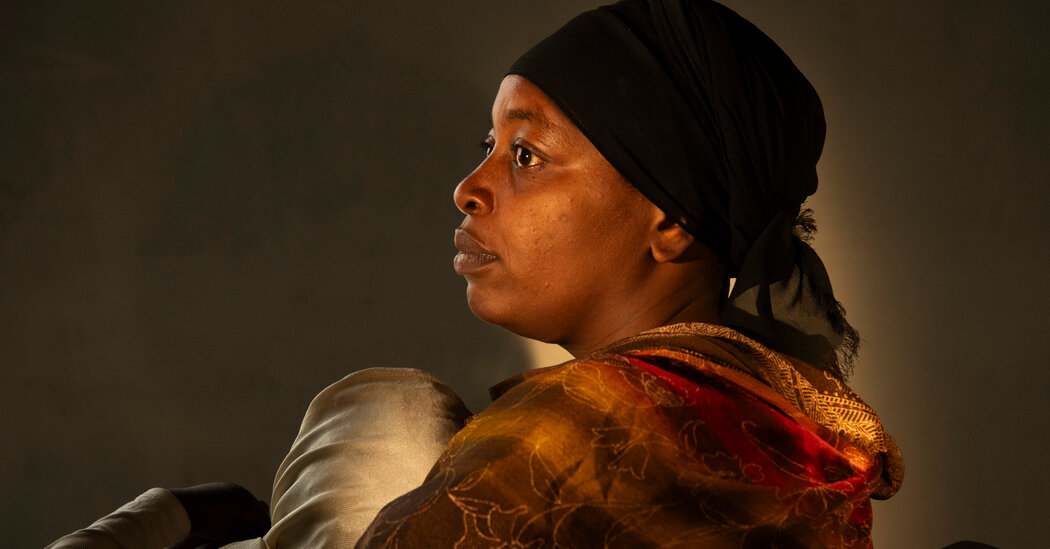Selestine Kemoli fled to the Kenyan Embassy in Riyadh in 2020, terrified and desperate.
Ms. Kemoli had been working in Saudi Arabia as a maid. Like many East Africans in her situation, she said, she was being abused. She told the embassy’s labor attaché that her boss slashed her breasts with a paring knife, forced her to drink urine and raped her.
Broke and alone, she wanted help getting home to her two children in Kenya.
“You are beautiful,” the labor attaché, Robinson Juma Twanga, responded, according to Ms. Kemoli.
Mr. Twanga offered to help, she said, but with a catch. “I will sleep with you, just the same way your boss has slept with you,” she remembers him saying.
Multiple women, who did not know each other and lived in separate counties, told The New York Times that when they fled abuse in Saudi Arabia, Mr. Twanga demanded sex or money, or pressured them to go into sex work to pay for a ticket home.
Lawyers say they have collected similar accounts from numerous women involving other embassy officials. They said that Mr. Twanga is but one example of how these officials exploit women at their most vulnerable moments.
A spokesman for William Ruto, Kenya’s president, commenting on behalf of the Foreign Ministry, said he had no knowledge of such complaints or any mistreatment by embassy officials.
Reached by phone and told what the women had said about him, Mr. Twanga replied: “I cannot get involved in that kind of story.” He said he is retired.
The women, who were interviewed across Kenya, gave consistent accounts. They said Kenyan officials insulted them and questioned whether they needed help, even when they arrived at the embassy destitute and with visible signs of abuse.
Ms. Kemoli, for instance, still has a scar across her chest and arms.
“They didn’t care for us,” said Faith Gathuo. She left for Saudi Arabia in 2014 and said that, when she sought help after being beaten and raped, another embassy official demanded money and anal sex.
Tens of thousands of Kenyans go each year to Saudi Arabia, where they can earn more than in their home country, which is in a prolonged economic crisis. Hundreds have died. Many more have endured abuse, gone unpaid or wound up detained in a country that lacks effective legal protection for East African workers.
A Times investigation last month revealed that powerful East African and Saudi figures make money off the labor system that sends these workers abroad.
When things go wrong, these latest interviews show, other powerful officials seek to profit.
Multiple women identified Mr. Twanga. Ms. Kemoli said he asked for sex. Two others said that when they asked for help, he berated them and told them to return to their employers.
A fourth woman, Feith Shimila Murunga, said that her boss beat her and poured hot water on her as punishment. When she sought the embassy’s help, she said, Mr. Twanga told her that if she didn’t want to return to her employer, maybe she could become a prostitute.
Lawyers in Nairobi provided the written accounts of six other women who said Mr. Twanga refused to help or told them to go into sex work.
“There’s no one holding them accountable,” said Bonareri Okeiga, who until recently was a program coordinator at Global Justice Group, a legal aid organization that has helped women document their experiences in hopes of getting them compensation.
While Mr. Twanga’s name surfaced repeatedly, workers and their families also described difficult experiences with other officials.
The relatives of three workers who died in Saudi Arabia said that officials at Kenya’s Foreign Ministry solicited cash to bring the bodies home. Hussein Mohamed, the president’s spokesman, said families were sometimes asked “to chip in” because the ministry cannot afford to pay for all of the bodies.
But relatives who returned to the ministry with lawyers said that they were told that they did not actually need to pay.
Years after returning from Saudi Arabia, Ms. Gathuo still has a gap in her smile from when, she said, her boss smashed her face with a pressure cooker. After he raped and impregnated her, she said, she escaped.
An embassy official offered to help, she said, if she paid him and had anal sex with him. She agreed, she said, and gave him all she had — about $500. But he never sent her home. Eventually, Saudi Arabia deported her.
Mr. Mohamed, the presidential spokesman, did not answer questions about Ms. Gathuo’s account.
Ms. Kemoli, who said her employer raped and cut her, said she refused Mr. Twanga’s proposition for sex. A well-connected relative in Kenya ultimately contacted the International Organization for Migration, which bought her a ticket home in 2021.
Ms. Kemoli said she has never been fully paid for her work in Saudi Arabia. She said she suffers from insomnia and often breaks down sobbing, seemingly unprompted. She said she has attempted suicide.
Sometimes, she said, her children ask about her scars.
“I don’t know what to tell them,” she said.
